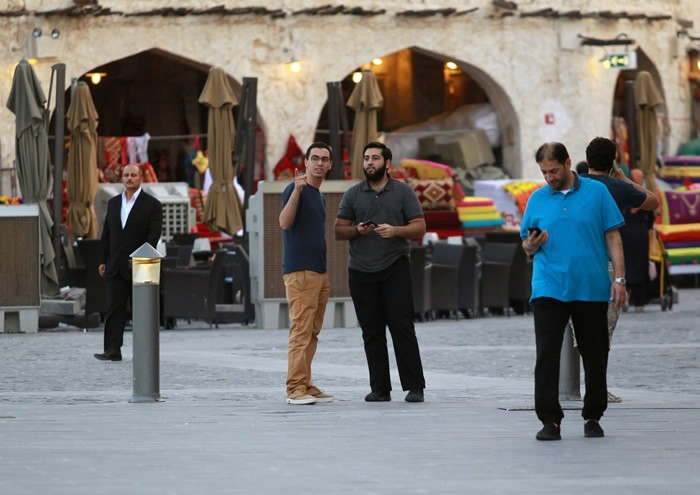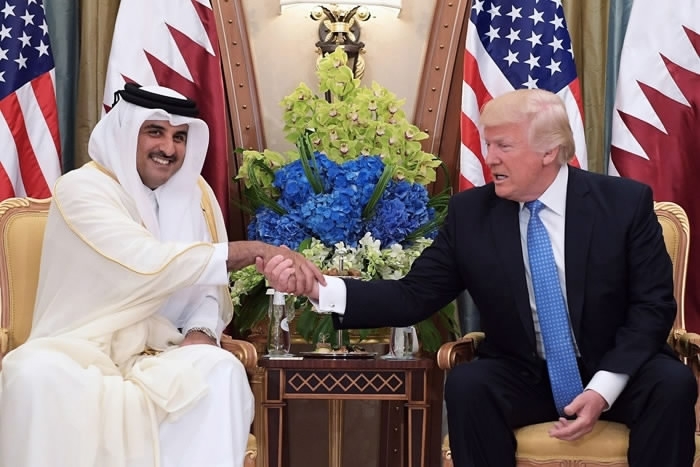Guest commentary Meir Javedanfar
The current "diplomatic crisis" between Qatar and Saudi Arabia is unlikely to last long as both sides need each other, especially the Qataris.
The isolation of Qatar by Saudi Arabia which was then followed by Qatar's other immediate neighbors Bahrain, the United Arab Emirates (UAE), as well as other countries such as Yemen, Egypt and the Maldives has left Qatar with few good options in the long run.

Men stand at Souq Waqif market in Doha, Qatar on June 6, 2017. /VCG Photo
Food blockade
In the short run, Qatar can turn to Iran for some of its immediate economic needs such as food imports. It can also turn to Turkey for diplomatic and economic cover, especially when it comes to import of food and other basic necessities.
However, in the long run, these two countries will be unable to replace Saudi Arabia and Qatar's immediate neighbors to meet the country’s immediate needs. Qatar is an arid, desert state that has always imported more than 90 percent of its food. The majority of its food is imported via land, from its Saudi border.
Now that its three immediate neighbors – Saudi Arabia, the UAE and Bahrain – have cut relations and closed their borders, it will be very expensive and cumbersome to replace them. Shipping from Iran and air freight from Turkey and other countries are much more expensive and not a long-term solution. In fact, some Qatari supermarkets are already running out of food.
Why the US is important
Furthermore, Qatar significantly improving its diplomatic relations with Iran as a backlash against the Saudis is fraught with dangers; it could jeopardize Qatar's relations with the United States.
Qatar hosts 11,000 US soldiers at the US forward headquarters of Central Command used for US missions in Syria and Afghanistan, and the important Al Udeid airbase. This is in addition to a significant, multibillion-dollar trade between the two. Any significant bump in improved diplomatic and economic relations with Iran could lead to US pressure, something which the Qataris will want to avoid, especially now that they are even more isolated than before.

US President Donald Trump (R) shaking hands with Qatar's Emir Sheikh Tamim Bin Hamad Al-Thani during a bilateral meeting in the Saudi capital Riyadh on May 21, 2017. /VCG Photo
The current US administration is also unlikely to want this crisis to continue for long. The Trump administration wants to build an anti-Iran administration in the region. The current split between Qatar and its immediate neighbors who are all members of the Gulf Cooperation Council is a long-term setback for the US and a boost for Iran.
The US badly wants to weaken Iran, in order to reduce its influence in Syria, Yemen and Iraq. Therefore, sooner or later, probably sooner, the US is likely to start to act as a go-between for the Saudis and Qataris, in order to patch things up, and to stop Iran from enjoying the benefits of the current split. It could also end up pressuring them, especially the Qataris, to find a solution and fast.
So in the immediate future, expect the two sides to dig in and for things to get worse. But this crisis is unlikely to last long. Both sides need each other and no one really wants yet another conflict in the Middle East.
(Meir Javedanfar is an Iranian-Israeli Middle East analyst. He teaches at the Interdisciplinary Center Herzliya in Israel and is a research fellow at the Ezri Center for Iran & Persian Gulf Studies at the University of Haifa. The article reflects the author's opinion, not necessarily the view of CGTN.)
Related stories:
Trump backs Saudi-led efforts to isolate Qatar
Erdogan speaks to Gulf leaders in attempt to diffuse Qatar crisis
UAE demands 'guaranteed road map' before restoring ties with Qatar










